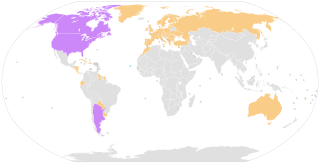 W
WThe European Convention on Recognition and Enforcement of Decisions concerning Custody of Children and on Restoration of Custody of Children is an international treaty of the Council of Europe that deals with international child abduction. Like the Hague Abduction Convention it was drafted in 1980 and entered into force in 1983.
 W
WThe Hague Convention on Protection of Children and Co-operation in Respect of Intercountry Adoption is an international convention dealing with international adoption, child laundering, and child trafficking in an effort to protect those involved from the corruption, abuses, and exploitation which sometimes accompanies international adoption. The Convention has been considered crucial because it provides a formal international and intergovernmental recognition of intercountry adoption to ensure that adoptions under the Convention will generally be recognized and given effect in other party countries.
 W
WThe Hague Convention on the Civil Aspects of International Child Abduction or Hague Abduction Convention is a multilateral treaty developed by the Hague Conference on Private International Law (HCCH) that provides an expeditious method to return a child internationally abducted by a parent from one member country to another.
 W
WThe Hague Convention on parental responsibility and protection of children, or Hague Convention 1996, officially Convention of 19 October 1996 on Jurisdiction, Applicable Law, Recognition, Enforcement and Co-operation in respect of Parental Responsibility and Measures for the Protection of Children or Hague Convention 1996 is a convention of the Hague Conference on Private International Law. It covers civil measures of protection concerning children, ranging from orders concerning parental responsibility and contact to public measures of protection or care, and from matters of representation to the protection of children's property. It is therefore much broader in scope than two earlier conventions of the HCCH on the subject.
 W
WThe Hague Convention on the International Recovery of Child Support and Other Forms of Family Maintenance, also referred to as the Hague Maintenance Convention or the Hague Child Support Convention is a multilateral treaty governing the enforcement of judicial decisions regarding child support extraterritorially. It is one of a number of conventions in the area of private international law of the Hague Conference on Private International Law in 2007. The convention is open to all states as well as to Regional Economic Integration Organizations as long as they are composed of sovereign states only and have sovereignty in the content of the convention. The convention entered into force on 1 January 2013 between Norway and Albania, with Bosnia-Herzegovina (2013), Ukraine (2013), the European Union, Montenegro (2017), United States (2017), Turkey (2017), Kazakhstan (2017), Brazil (2017), Honduras (2017), Belarus (2018), Guyana (2020), Nicaragua (2020), United Kingdom (2021), Serbia (2021) and New Zealand (2021) following suit. Because the EU acceptance of the convention applies in 27 EU countries, the convention applies in 42 countries worldwide.
 W
WThe Hague Divorce Convention, officially Convention on the Recognition of Divorces and Legal Separations is a convention concluded by the Hague Conference on Private International Law (HCCH). It regulates the recognition of divorces and legal separations provided they have been performed according to the correct legal process in the state where the divorce was obtained. Not all divorces need to be recognized under the convention. Only those divorces obtained in a state where ;the "respondent" had its residence the "petitioner" had his residence corresponds to the nationality of both spouses corresponds to the nationality of the petitioner and where he lived, or had lived for 1 year in the past 2 years corresponds to the nationality of the petitioner, and where he is present, while the last state of their joint residence does not provide for divorce
 W
WThe Hague Protection of Adults Convention, formally the Convention on the International Protection of Adults, is a convention concluded by the Hague Conference on Private International Law in 2000. The convention entered into force in 2009 and currently applies in ten states. The convention is aimed at the protection of vulnerable adults, persons who are "by reason of an impairment or insufficiency of their personal faculties, are not in a position to protect their interests". The conventiondetermines which courts have jurisdiction to take protection measures determines which law is to be applied in the circumstances; and who may be a vulnerable person establishes a system of central authorities which should cooperate, locate vulnerable adults and give information on the status of vulnerable persons to other authorities.
 W
WThe Convention on the Recovery Abroad of Maintenance is a 1956 United Nations treaty which allows individuals to enforce judicial decisions regarding child support and alimony extraterritorially. It can be used only if the person seeking maintenance and the person paying maintenance are both resident in states that have ratified the Convention.